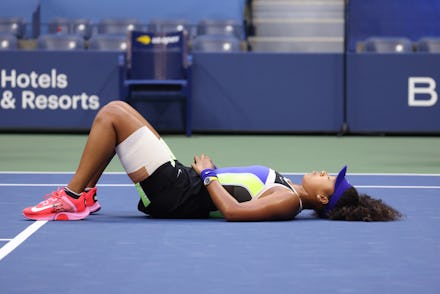The Naomi Osaka documentary highlights the humanity of superstar athletes

Assuming the Tokyo Olympics aren't cancelled last minute, there's one athlete I'm more excited to watch compete than all the others: Naomi Osaka, who's returning to the court after a well-deserved mental health break. The tennis phenom and four-time Grand Slam champion opted out of the last two major competitions, but now she's playing on her own turf, in her homeland of Japan.
I already admired Osaka for her talent, poise and bravery in speaking publicly about mental health. I keep getting angry on her behalf when critics like Megyn Kelly, for example, call her a liar, a diva or entitled for declining a stressful post-match press conference. Watching the new Netflix docu-series about the 23-year-old tennis champ helped me get to know Osaka far better — not only as an incredible athlete, but also as a sensitive overachiever with the weight of the world on her shoulders. Naomi Osaka is a profound and intimate portrait of her singular, trailblazing journey to sports superstardom, and it made me surer than ever that we must protect her at all cost.
The three-part limited series picks up with the victory that catapulted her career into overdrive: Osaka's historic defeat of Serena Williams at the 2018 U.S. Open. She followed-up that Grand Slam win with a consecutive triumph at the Australian Open in early 2019, becoming the first Asian player to be ranked number one in singles.
Achieving international celebrity and becoming the best player in the world when she was barely 21 put Osaka under immense pressure, however. Her dad, Leonard Francois, says in the documentary that she celebrated her first Grand Slam win for a few days, but then pivoted to training for the next tournament, because she felt she had to prove she wasn't a fluke.
Then, with two championships under her belt, Osaka started losing matches. Defending her title at the 2019 U.S. Open, she was knocked out in the fourth round by Swiss player Belinda Bencic, and the blow was devastating. "For so long I’ve tied winning to my worth as a person," Osaka says in the documentary. "What am I, if I’m not a good tennis player?" During a fallow period in early 2020, while also mourning the death of her mentor Kobe Bryant, she worries she's a disappointment. "I'm feeling like I let him down," Osaka says tearfully. "I'm supposed to carry on his mentality in tennis, but here I am [...] losing these matches because I'm mentally weak." It's uncomfortable and heartbreaking to watch a young athlete who's so clearly an extraordinary talent be so hard on herself.
Feeling like a vessel for other people's aspirations is a theme she returns to a few times. Osaka's father started coaching her and her sister, Mari, when Naomi was just three, inspired by seeing the Williams sisters compete at the 1999 French Open. From then on, it was nonstop tennis for the homeschooled sisters. Osaka remembers people telling her dad she'd never achieve anything, which fueled her drive her to prove them wrong. "I started making a list of all the historic things I could accomplish. Being the first Japanese woman to win a Grand Slam was at the top of my list," she says in the series. But when you achieve your wildest dreams before you're old enough to drink, how do you sustain momentum without torturing yourself?
For Osaka, it was about finding her voice outside of her extraordinary profession. In the summer of 2020, Osaka joined a march in Minneapolis protesting racism. That September at the U.S. Open, she donned seven face masks printed with the names of seven victims of police violence, like George Floyd, Breonna Taylor and Tamir Rice. In the docu-series, Osaka talks about wanting to better represent Black Asian folks and shares the intention to improve her Japanese. She decided to renounce her American citizenship to represent her homeland at the Tokyo Olympics (which prompted some to misguidedly say her "Black card" was revoked).
Osaka's multidimensional evolution has stretched into 2021, most notably when she refused to sacrifice her mental health to appease the press. We're accustomed to watching professional athletes suppress their humanity in pursuit of winning, and Osaka's refusal to capitulate was a shock to the sporting establishment. Critics called her a brat, but I think it'd be hard for them to watch this raw, intimate documentary about her journey without sympathizing with her suffering.
"No one really knows all the sacrifices you make just to be good," Osaka says early in the series. Later on, while vacationing in Haiti with her family, the tennis star wonders what her life would be like if she'd been able to do normal young person stuff, like go to college. It only lasts a moment; Osaka acknowledges she's too far down her singular, incredible path. In so many ways, she's an exceptional athlete. But it's also incredible to see her embrace her fallible humanity. It might actually be the more impressive feat.